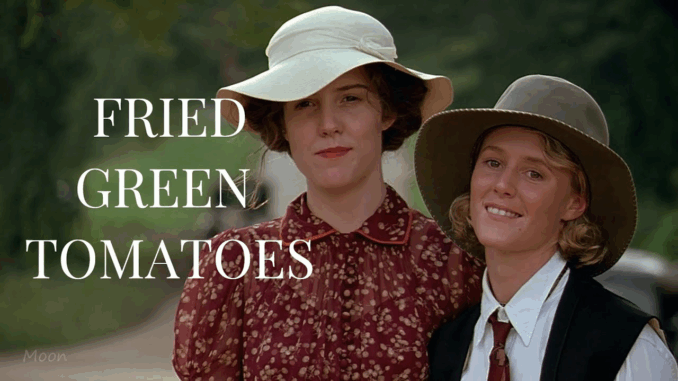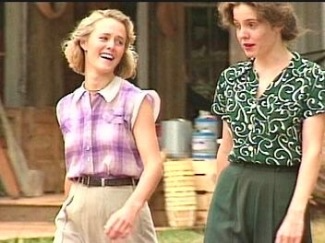
Fried Green Tomatoes is more than just a Southern tale of friendship and food—it is a deeply emotional journey through the lives of women facing trauma, repression, and transformation. Each central character endures unique struggles that not only shape their destinies but also resonate powerfully with audiences decades after the film’s release.
Evelyn Couch: From Invisible to Empowered
Evelyn Couch, portrayed by Kathy Bates, begins her journey as a timid, middle-aged housewife caught in the grips of an identity crisis. Her husband is indifferent, her efforts to reconnect go unnoticed, and she is swallowed by a society that renders aging women invisible.
Her transformation begins through her friendship with Ninny Threadgoode. As she listens to stories of boldness and courage from Whistle Stop’s past, Evelyn starts to reclaim her own life. She finds the strength to break away from societal expectations, develop self-respect, and even assert herself with bold phrases like “Towanda!”—a symbolic alter ego that represents her newfound empowerment.
Her struggle is one of self-worth and emotional suppression. Evelyn’s arc is especially poignant for viewers who have felt unseen or stuck in stagnant relationships. Her journey reminds us that reinvention is possible at any age.
Ninny Threadgoode: The Keeper of Memory and Identity
Jessica Tandy’s Ninny Threadgoode is more than just a charming old woman in a nursing home. She represents the power of memory, storytelling, and the continuity of the past within the present. Her narratives serve as lifelines for both Evelyn and the audience, offering windows into a different time and a different kind of resilience.
Ninny’s own hardships are subtly woven into the stories she tells. Though it’s debated whether Ninny and Idgie are one and the same, her emotional attachment to Ruth and Idgie’s tale is deeply personal. Ninny faces aging alone, with no clear family visitors, yet her spirit remains vibrant. Her challenge is loneliness and the fear of being forgotten—something many elderly individuals can relate to.
Through her stories, she not only keeps her loved ones alive but also refuses to be silenced. Her voice, memories, and humor breathe life into Whistle Stop once more.
Idgie Threadgoode: The Rebellious Heart of Whistle Stop

Idgie, portrayed by Mary Stuart Masterson, is the emotional and moral core of the flashback sequences. From a young age, she rebels against expectations: she wears pants, plays poker with men, drinks, and stands against racism—all in a time when women were expected to be docile and obedient.
Her greatest hardship begins with the death of her beloved brother Buddy, which leaves her emotionally closed off. However, Ruth’s arrival becomes a turning point, offering Idgie a second chance at connection and love. When Ruth becomes trapped in an abusive marriage, Idgie risks everything to rescue her. Together, they create a safe space not only for themselves but for their community through the Whistle Stop Café.
Idgie’s struggle is about identity and grief. She defies gender norms, challenges social injustice, and faces the threat of persecution—especially for her intimate relationship with Ruth, which, though subtle in the film, is a central element of the story. She lives with courage but also deep vulnerability, making her one of the most compelling characters in Southern cinema.
Ruth Jamison: Grace in the Face of Oppression
Mary-Louise Parker’s Ruth is a character shaped by quiet suffering and immense inner strength. Initially introduced as prim and devout, she quickly becomes entangled in a violent marriage. Her decision to leave Frank Bennett and raise her child with Idgie is nothing short of revolutionary for a woman of her time.
Ruth faces abuse, societal judgment, and ultimately terminal illness. Yet she navigates her hardships with dignity, offering kindness even to those who wrong her. Her role as a mother to Buddy Jr., a friend to Idgie, and a symbol of perseverance makes her story especially tragic and inspiring.
Her death is one of the film’s most heart-wrenching moments. However, her legacy lives on in the community she helped build, in Idgie’s continued defiance, and in the lives she touched.
Sipsey: The Strength of the Unspoken
Played by Cicely Tyson, Sipsey is the unsung hero of the story. As a Black woman working in the kitchen of the Threadgoode household and later the café, she quietly bears the burdens of race, class, and survival in the Jim Crow South.
Her most defining moment comes when she protects Ruth and Idgie by taking extreme action to stop Frank Bennett, Ruth’s abusive husband. Her loyalty and courage go largely unacknowledged in the main narrative, reflecting the invisibility often forced upon Black women of her era.
Sipsey’s life is a testament to quiet resistance and unspoken strength. Though her screen time is limited, her impact is profound. She is part of the hidden scaffolding that allows the other characters to survive and thrive.
Buddy Threadgoode: A Life Cut Short, A Legacy That Endures
Though Buddy (played by Chris O’Donnell) appears only briefly, his death sets the emotional tone for the rest of the film. His charm, warmth, and promise symbolize a world that could have been. Idgie’s grief over losing her brother becomes the source of her lifelong refusal to conform.
Buddy’s death also reflects a deeper theme: the randomness and cruelty of life, and how loss shapes identity. He may be absent for most of the film, but his presence lingers like a ghost, influencing everything Idgie becomes.
Conclusion: A Web of Struggle and Strength
The characters in Fried Green Tomatoes are bound not only by friendship but by hardship. From Evelyn’s quiet desperation to Idgie’s wild resistance, from Ruth’s quiet courage to Sipsey’s silent rebellion—every arc is laced with pain, love, and transformation.
Their stories are reminders that strength often lies in vulnerability, and that healing can come from unexpected places: a story shared over time, a café that feels like home, or a bond that transcends all conventions.
Even decades later, Fried Green Tomatoes remains a timeless exploration of how human beings—especially women—endure, resist, and bloom in the face of adversity.
